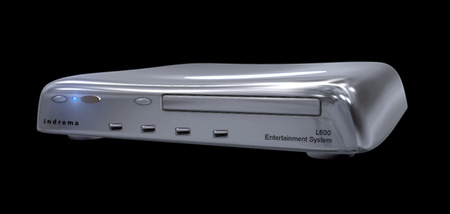Indrema open sourcing console gaming
Nov 7, 2000 — by Henry Kingman — from the LinuxDevices Archive — 3 viewsHenry Kingman, producer of ZDNet's Linux Resource Center, reports on a press conference earlier this week in which Indrema CEO John Gildred detailed his company's plans to redefine the high-end gaming market through Indrema's upcoming Linux-based set-top gaming system which will be supported by an open source game development model, plus, hopefully, an enthusiastic game development community. Kingman writes . . .
Upstart console game vendor Indrema hopes to change the landscape of game development by leveraging open source development practices within the console game market. The company today announced a number of partnerships aimed at lowering barriers to game development and attracting game authors to the Indrema platform, which is gearing up to launch its first product, a $299 Linux-based multi-purpose gaming, Internet, DVD and mp3 center, in Spring, 2001.

First, Indrema announced the launch of the Indrema Developer Network (idn.indrema.com), a collaborative programming resource hosted at San Francisco's up-scale open source development farm, CollabNet. According to Indrema CEO John Gildred, CollabNet and its famous founder Brian Behlendorf will help his company offer Indrema developers a level of support unprecedented on any platform.
“Indrema will offer an open source software layer with a standardized API to handle much of the basic low-level functions of game development,” according to Gildred. “Playability, storyline and multimedia stay proprietary.”
“Developers in gaming are building deep stack technology, including low-level rendering, networking, etc,” said Behlendorf, who co-leads one of the most successful collaborative development efforts ever, the Apache Web server. “The open source approach will enable developers to focus more on character development and creativity, and ultimately go from being gamers to being game developers.”
Behlendorf added that his company will provide a tool suite that enables Indrema developers to form a community around the code, fix each others bugs, make common infrastructure and also develop proprietary tools. This suite includes CVS source tracking, bugtracking tools and discussion forums.
Indrema's second announcement is a partnership with MetroWorks which will bring a low- or no-cost Indrema-specific version of popular developer tool CodeWarrior to Indrema developers. Gildred could not verify that it would be completely free, but said in any case it would be orders of magnitude cheaper than development environments for other consoles, which typically cost as much as $20,000 in the case of the PlayStation II.
Finally, Indrema announced that it will work with MetroLink to ensure that Indrema's Xtrema and OpenVideo APIs are completed in a timely fashion and become standards for 3D graphics in next-generation versions of X. MetroLink manages x.org and the source code for the X Windowing System, itself one of the most successful consortium-developed open standards-based technologies
of all time.
Indrema plans to certify games either as downloadable freeware or as commercial products distributed through Indrema's online and retail channels. Its devices will use a Digital Rights Management system to ensure that only certified games can be used with the device.
Asked whether he expects hackers to use the Indrema console, essentially a loss leader at $299, for other-than-intended purposes, Gildred first sounded exasperated: “Why would anybody want to make a firewall out of something that can play mp3s, DVDs, games…” He then went on to note that he was certain it would happen, and that Indrema would tolerate if not exactly encourage it. “We're fortunate in being involved with a community that is curious about how the hardware works, that wants to push the limits of what you can do with something. So if people want to extend the device with more storage or whatever, that's fine. We will, however, defend our digital rights management system to the nth degree.”
The Indrema software development kit is available for download from the IDN Website, and enables Indrema games to be developed now on any PC with a 2.2.x Linux kernel (Red Hat 7 recommended), 64-128MB of RAM, 300-600MHz x86 processor and an nVidia GeForce 2 GTS graphics card or better. A 0.3 version of the SDK, complete with surround-sound, 3D graphics and dvlinux kernel will be released in early November.
Indrema employs about 20 people, including contractors, about 10 of whom are working on the hardware. Gildred expects hardware design for the L600, Indrema's first console offering, to be finalized late in 2000. Based on an x86 processor in the 600MHz range, Gildred said that, “We're designing the L600 to perform upwards of the X box.”
Gildred said that a single title would ship with the console initially, but that other titles should follow quickly. “We don't want to announce prematurely, but porting to Indrema will be very easy. We want to be known as the platform for the hottest game titles. Then we'll pursue exclusive games.”
Asked about controllers and third-party add-ons, Gildred said that interest from vendors has been high. The console will include a USB interface for such devices, which could even include office equipment, printers, and other peripherals at some future date. The company is also working with one other manufacturer that will produce complete Indrema-ready devices.
This article was originally published on LinuxDevices.com and has been donated to the open source community by QuinStreet Inc. Please visit LinuxToday.com for up-to-date news and articles about Linux and open source.